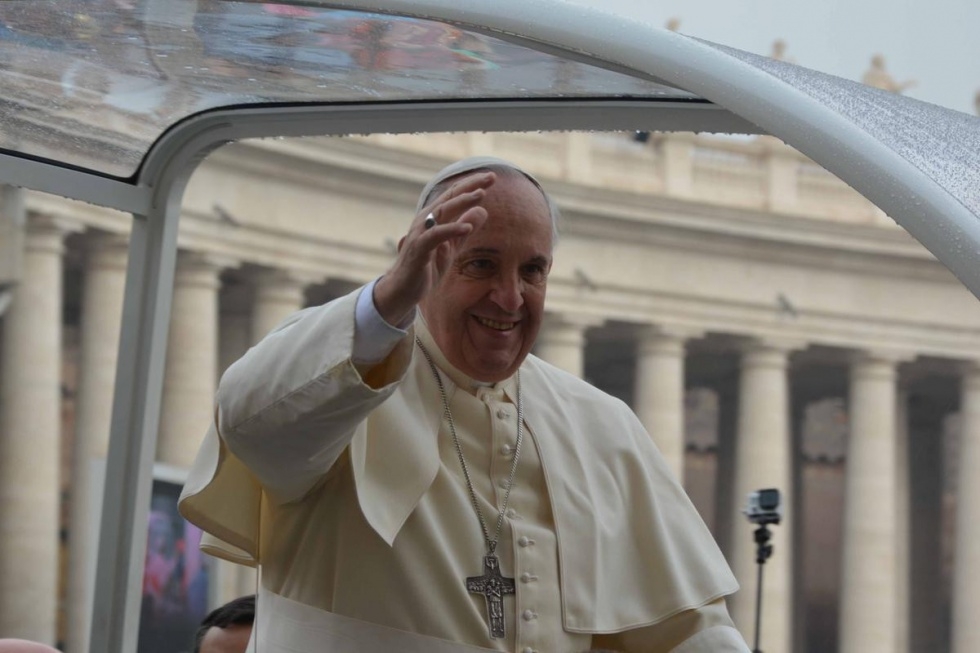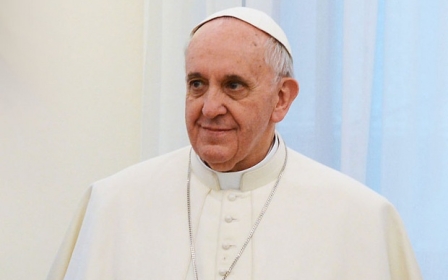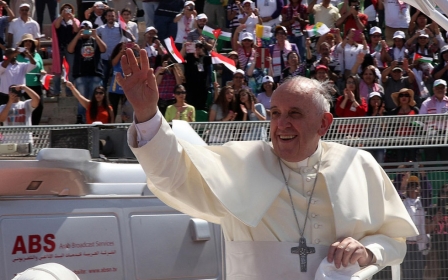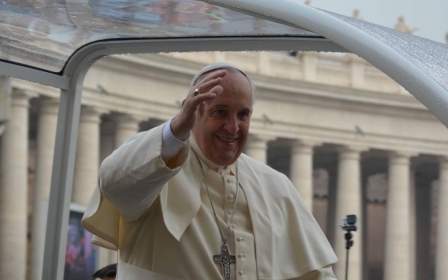Pope Francis: Finding deliverance in unexpected places

Pope Francis has led a move to have the Vatican officially recognise Palestine as a state in “hope for a solution to the Palestinian question according to the two-state solution” - a move that could push the Israelis to make concessions towards their rivals.
The question of Palestine speaks to the basic fundamentals of human justice and social equality, and the leader of the Catholic Church, Christ’s vicar on earth, has spoken directly to the plight of Palestinians, who overwhelming follow the Muslim faith. And it’s a move that may end up being a game changer for the “peace process”.
The Pope reminds us that social justice on earth transcends judgment in the afterlife. He reminds us that our most urgent earthly needs trump our spiritual yearnings. Give a hungry man a fish, and the man will care little whether the fishermen is a Christian, Muslim, Jew or atheist.
I’m an atheist, but I will follow any fisher of men who leads us to the Promised Land, and to that end, I’m an unabashed fan of the Pope’s religious faith. Not the doctrine of Christianity per se, but whatever gospel that has inspired the Pope to speak to the social and economic challenges of our time – including the injustices carried out against the Palestinians.
Since taking over from his predecessor, Pope Benedict, Francis has championed a narrative that challenges the excesses of capitalism and globalisation, and their offspring: income inequality, wealth disparity, and social inequality.
Pope Francis’ fight for justice, transparency, fairness and equality could easily be defined as my non-religious religion. Equally, the Reverend Martin Luther King’s Christianity and Malcolm X’s Nation of Islam constitute the core of my non-religious belief. It matters not whether I believe in the deity of their respective faith, it matters that they were able to use their respective deity in a constructive way to get us, all of us, moving towards where we need to be. Praise Jesus. Praise Allah. Whatever.
Justice, transparency, fairness and equality are what we all want. It’s what the entire Middle East craves. Westerners make the mistake of believing religion is an irreconcilable fissure in the Middle East. They’re wrong. Excluding the militant takfiri dead-enders, what pits neighbour against neighbour is injustice, inequality and hopelessness.
Arabs, Persians, Kurds and Turks all want the same earthly things: food, shelter, health and security. They, like me, will follow anyone who can deliver those needs even if it means following a leader who does not share the same religious or ethnic identity, and even if it means abandoning their more high-minded ideals.
Case-in-point: the expansion of Iranian influence throughout the predominantly Arab Middle East.
Skillfully and pragmatically, the Ayatollah Khamenei has cultivated Iran’s image into that of an anti-colonialist, populist and pluralist beacon in the Middle East.
“For 50 years, the Communists were the face of the world’s liberation movements, the champion of the poor, dispossessed, and oppressed,” notes Robert Baer, a former CIA operative who has spent decades in the Middle East. “The torch has passed to Iran. Iran’s revolution in the Middle East has less to do with religion than with politics and economics. Iran has exploited Shiite discontent, but it also has promised to redress global economic inequality, Third World political impotence, colonialism and injustice.”
A 2007 Pew Research poll found that 55 percent of Palestinians had a favorable opinion of Iran - an astonishing result given the Palestinian’s historical ties with Sunni Arab Gulf states, and especially so given the Palestinians supported Saddam during both the Iraq-Iran war and the 1991 Gulf War. What was behind this sudden about face towards their Persian-Shiite adversaries? Iranian President Ahmadinejad was threatening military action against the Palestinians’ colonial occupiers – Israel.
“Iran overcame sectarian and ethnic differences by offering the Palestinians a real plan for fighting Israel…the Palestinians’ embrace of Shiite Iran was as if Ireland woke up one morning and abandoned the Pope for the Anglican Church,” writes Baer.
When Hezbollah leader Hassan Nasrallah forced the withdrawal of Israel from Lebanon in 2000 after a 22-year occupation, and then defeated Israel in the war of 2006, the Iranian-backed Shiite Nasrallah became a pin-up boy throughout the Sunni Arab world. “Nasrallah captured the hearts of millions in the Islamic world. His face appeared on billboards, key chains and screensavers. People sat glued to their televisions for hours as he delivered his passionate speeches. His popularity went far beyond any of the regional presidents and kings who had ruled their countries for decades,” observes The Fanack Chronicle.
Nasrallah’s popularity extended to the Occupied Territories. “Who cared if Nasrallah was a Shiite imam? He knew how to fight,” said Baer. While Nasrallah’s popularity has declined more recently, mostly due to Hezbollah’s support of the Assad regime in Syria’s civil war, the point remains that the oppressed and downtrodden will follow a leader who can assuage suffering, no matter the leader’s religious or ethnic identity.
The Palestinians would hail Pope Francis - maybe many would even convert to Catholicism tomorrow - if he could deliver the Palestinians a viable state that guaranteed food, warmth, shelter, security, justice and equality. This fact is altogether lost in any discussion as it pertains to bringing about peace in the Middle East.
This is what makes the Pope’s recognition of Palestine as a state so critically important. Pope Francis and the Vatican have done what no US President or America has done – recognised Palestinian statehood. Thus the popularity of the Pope is set to soar, while US popularity in the Middle East remains at historic lows.
The issue of Palestine has profound personal resonance throughout the Middle East because of the shared Arab identity with Palestinians. “But on a more political level, Arabs also view the Palestinian issue as the greatest obstacle to peace and stability in the Middle East,” notes James Zogby, the founder of the Arab American Institute. “Majorities in every [Middle East] country polled see the resolution of the Arab–Israeli conflict as the linchpin to a brighter political future.”
If the West is unable to promise the Palestinians and the entire Middle East a viable alternative to Islamic fundamentalism, the very idea of secular democracy will be forever lost in the region. A 2010 poll found that 87 percent of Palestinians believed that the US is not committed to the peace process. “Arab anger over the Palestinian question limits the strength and depth of US partnerships and governments and peoples… and weakens the legitimacy of moderate regimes in the Arab world. Meanwhile, al-Qaeda and other militant groups exploit anger to mobilise support,” testified US General David Petraeus to a Senate Armed Services Committee in 2010.
Palestinians once stood behind secular democracy. They supported the secular PLO until it became obvious Arafat and his cronies were willing to give the idea of Palestinian statehood away in exchange for enriching themselves. Arafat went to his death with hundreds of million dollars next to his name, while his people couldn’t afford to keep the electricity running. When the self-serving corruption of both the PLO and Fatah was exposed, Gaza Palestinians turned to their next knight in shining armor – Hamas.
Last month, Hamas won a student election at a West Bank university, which is significant given student elections are a measure of a political mood in an electorate where no national elections have been held since Hamas won in 2006.
“Fatah didn’t fight in Gaza, Hamas fought in Gaza,” explained Suhaila, a 20-year-old English literature major at Berzeit University, to The New York Times. “Nobody believes in negotiations,” said another female student, who also asked for anonymity for the fear of government retaliation. “The president [Abbas] has abandoned us, and they take all the money that comes from abroad and distribute it among themselves.”
Earlier this year, Om Adam, a Gaza Palestinian who lost her son during the 2008-9 siege, told a reporter, “Gaza is a tomb; we are dead anyway. … Either you die pointlessly and slowly, or quickly with purpose.”
Palestinians are not hardwired for religious fundamentalism. They just want the right to live. The secular West abandoned them long ago, so who can blame them for finding hope via the Islamic militancy of Hamas and Hezbollah?
Although we can now ask another question: has Pope Francis offered the Palestinians an alternative to militant Islamic fundamentalism? There are 1.2 billion Roman Catholics, and followers of the Catholic faith occupy leadership positions in nearly all Western governments.
“Westerners tend to think of the Middle East as a place where religions are set in blood and stone,” observes Baer. “But sectarian divides do break down under the right circumstances, usually when there’s a common enemy like Israel or the United States.”
In time I’m sure we’ll find Pope Francis’ treaty with the Palestinians to be a bigger deal than we give it credit for. Now we wait.
- CJ Werleman is the author of Crucifying America, God Hates You. Hate Him Back, Koran Curious, and is the host of Foreign Object. Follow him on twitter: @cjwerleman
The views expressed in this article belong to the author and do not necessarily reflect the editorial policy of Middle East Eye.
Photo: File photo of Pope Francis
New MEE newsletter: Jerusalem Dispatch
Sign up to get the latest insights and analysis on Israel-Palestine, alongside Turkey Unpacked and other MEE newsletters
Middle East Eye delivers independent and unrivalled coverage and analysis of the Middle East, North Africa and beyond. To learn more about republishing this content and the associated fees, please fill out this form. More about MEE can be found here.





